environmental impacts of oxy-fuel and post-combustion CO2 capture, transport and injection processes
全氧烧嘴-速焰英国
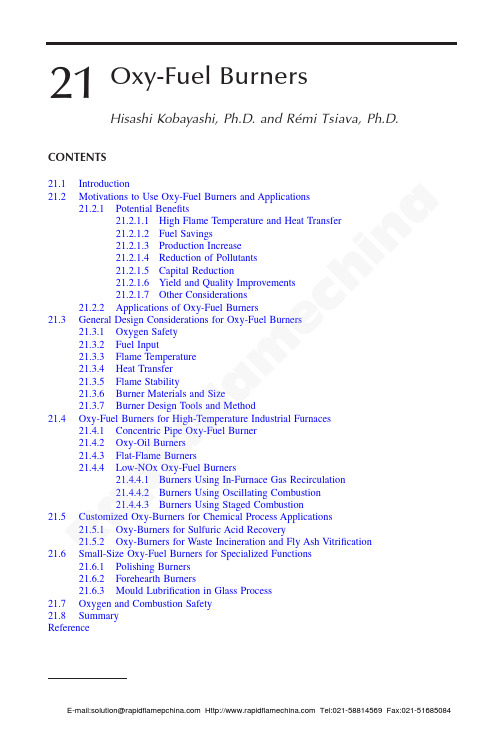
R
a
E-mail:solution@ Tel:021-58814569 Fax:021-51685084
p
idflamechin a
694
Industrial Burners Handbook
21.1 INTRODUCTION
R
21.2.1.1 High Flame Temperature and Heat Transfer High adiabatic flame temperature and high heat release rate and transfer are the main benefits for which traditional applications of oxy-fuel burners were developed. Welding with an oxy-acetylene flame, flame polishing of glass surfaces, and oxygen cutting of steel plates are some of examples of applications that take advantage of these oxy-fuel flame characteristics. 21.2.1.2 Fuel Savings The use of oxygen in a heating process eliminates the nitrogen introduced with combustion air from the process and hence eliminates the energy required to heat the nitrogen from inlet temperature to outlet temperature. For high-temperature processes (>2200°F or 1200°C) with no heat recovery, fuel savings when using oxygen can exceed 50%. As heat recovery is employed with the air combustion system, the savings achievable when switching to oxy-fuel combustion are reduced. A simple heat and mass balance on the furnace under each operating condition can provide accurate
保护环境的学术英语作文

保护环境的学术英语作文1. Protecting the environment is crucial for our survival. We need clean air to breathe, clean water to drink, and a healthy ecosystem to sustain us. Without a healthy environment, our lives would be at risk.2. Pollution is one of the biggest threats to the environment. It comes in many forms, such as air pollution from factories and vehicles, water pollution fromindustrial waste, and soil pollution from chemicals. These pollutants not only harm the environment but also have a negative impact on our health.3. Deforestation is another major issue that needs to be addressed. Trees are essential for maintaining the balance of oxygen and carbon dioxide in the atmosphere. When forests are destroyed, it not only leads to the loss of biodiversity but also contributes to climate change.4. Overconsumption is a significant factor contributingto environmental degradation. We need to reduce our consumption of natural resources and adopt more sustainable practices. This could include using renewable energy sources, recycling, and reducing waste.5. Climate change is a global crisis that requires urgent action. The burning of fossil fuels has led to an increase in greenhouse gas emissions, resulting in rising temperatures and extreme weather events. We need to transition to clean energy sources and reduce our carbon footprint.6. Biodiversity loss is another consequence of human activities. The destruction of habitats, overfishing, and illegal wildlife trade have led to the extinction of numerous species. Protecting biodiversity is essential for maintaining the balance of ecosystems and ensuring the survival of all living organisms.7. Education plays a crucial role in protecting the environment. By raising awareness and promoting sustainable practices, we can empower individuals to make informedchoices and take action to protect the environment. Education should start from an early age and be integrated into school curricula.8. Government policies and regulations are necessary to protect the environment. Governments should enforce strict environmental laws, promote sustainable development, and support renewable energy initiatives. International cooperation is also crucial to address global environmental issues.9. Individuals can make a difference by adopting environmentally friendly habits in their daily lives. This could include conserving energy and water, using public transportation or carpooling, and reducing waste by recycling and composting. Small actions can have a significant impact when done collectively.10. In conclusion, protecting the environment is not only essential for our own well-being but also for the future of our planet. We must take immediate action to reduce pollution, conserve natural resources, and mitigatethe effects of climate change. By working together, we can create a sustainable future for generations to come.。
A Study of environmental impact on m
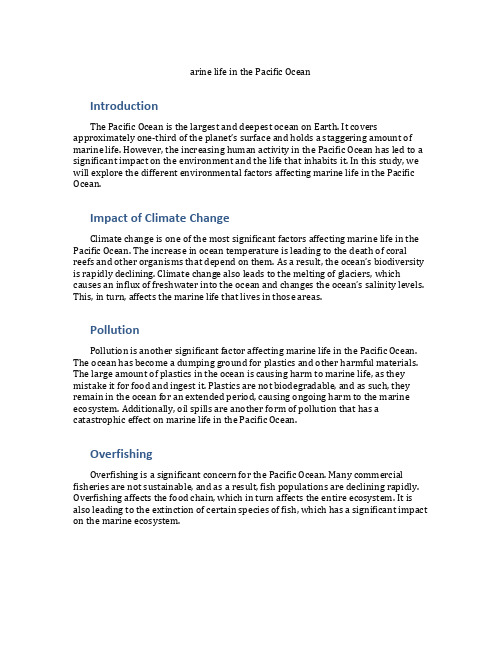
arine life in the Pacific OceanIntroductionThe Pacific Ocean is the largest and deepest ocean on Earth. It covers approximately one-third of the planet’s surface and holds a staggering amount of marine life. However, the increasing human activity in the Pacific Ocean has led to a significant impact on the environment and the life that inhabits it. In this study, we will explore the different environmental factors affecting marine life in the Pacific Ocean.Impact of Climate ChangeClimate change is one of the most significant factors affecting marine life in the Pacific Ocean. The increase in ocean temperature is leading to the death of coral reefs and other organisms that depend on them. As a result, the ocean’s biodiversity is rapidly declining. Climate change also leads to the melting of glaciers, which causes an influx of freshwater into the ocean and changes the ocean’s salinity levels. This, in turn, affects the marine life that lives in those areas.PollutionPollution is another significant factor affecting marine life in the Pacific Ocean. The ocean has become a dumping ground for plastics and other harmful materials. The large amount of plastics in the ocean is causing harm to marine life, as they mistake it for food and ingest it. Plastics are not biodegradable, and as such, they remain in the ocean for an extended period, causing ongoing harm to the marine ecosystem. Additionally, oil spills are another form of pollution that has a catastrophic effect on marine life in the Pacific Ocean.OverfishingOverfishing is a significant concern for the Pacific Ocean. Many commercial fisheries are not sustainable, and as a result, fish populations are declining rapidly. Overfishing affects the food chain, which in turn affects the entire ecosystem. It is also leading to the extinction of certain species of fish, which has a significant impact on the marine ecosystem.ConclusionThe Pacific Ocean is one of Earth’s largest and most important resources. However, human activity is affecting the environment and the life that inhabits it. Climate change, pollution, and overfishing are some of the significant environmental factors affecting marine life in the Pacific Ocean. It is essential to take action and reduce human impact to ensure the ocean continues to thrive. Sustainable environmental policies need to be put in place to ensure that we can protect and preserve the Pacific Ocean, along with its rich biodiversity, for generations to come.。
讲大气排放和污染海洋的英文外刊文章

讲大气排放和污染海洋的英文外刊文章Several problems are caused by the non-organic substance. We ought not to pour wastes into the ocean, because it not only pollutes the ocean, but also lead to a series of harmful consequence. First and foremost, the non-organnic things, for instance, plastic bags, may kill fish and whales. Second, fishes can't digest them. Finally, some of the rubbish is inherently toxic, they will posion marine life.We must take actions to protect our whale from dying. One thing we should do is creating a better system of disposing of rubbish. Another effective solution is making ships environmentally friendly. Sypermarkets shall stop the giving of plastic bags.As a captain of the ship, you should spare no efforts to think more helpful ideas and stop dumping rubbish from now on. We all need to raise awareness of these problems. It now becomes necessary that we must act now, before it is too late!The seas and oceans receive the brunt of human waste, whether it is by deliberate dumping or by natural run-off from the land.In fact over 80% of all marine pollution comes from land-based activities and many pollutants are deposited inestuaries and coastal waters. Here the pollutants enter marine food chains, building up their concentrations until they reach toxic levels. It often takes human casualties to alert us to pollution and such was the case in Minimata Bay in Japan when many people died as a result of a pollutant building up in food chains.A factory was discharging waste containing methyl mercury in low concentrations into the sea and as this pollutant passed through food chains it became more concentrated in the tissues of marine organisms until it reached toxic levels.As a consequence 649 people died from eating fish and shellfish contaminated with mercury and 3500 people suffered from mercury poisoning.。
大学生态环境保护的英文作文
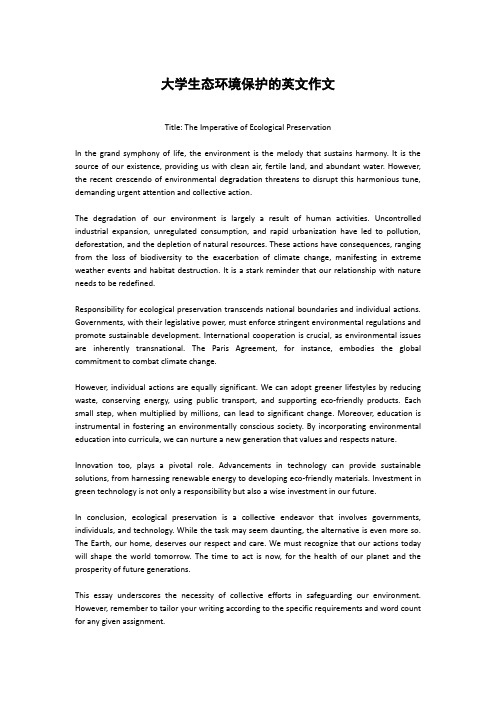
大学生态环境保护的英文作文Title: The Imperative of Ecological PreservationIn the grand symphony of life, the environment is the melody that sustains harmony. It is the source of our existence, providing us with clean air, fertile land, and abundant water. However, the recent crescendo of environmental degradation threatens to disrupt this harmonious tune, demanding urgent attention and collective action.The degradation of our environment is largely a result of human activities. Uncontrolled industrial expansion, unregulated consumption, and rapid urbanization have led to pollution, deforestation, and the depletion of natural resources. These actions have consequences, ranging from the loss of biodiversity to the exacerbation of climate change, manifesting in extreme weather events and habitat destruction. It is a stark reminder that our relationship with nature needs to be redefined.Responsibility for ecological preservation transcends national boundaries and individual actions. Governments, with their legislative power, must enforce stringent environmental regulations and promote sustainable development. International cooperation is crucial, as environmental issues are inherently transnational. The Paris Agreement, for instance, embodies the global commitment to combat climate change.However, individual actions are equally significant. We can adopt greener lifestyles by reducing waste, conserving energy, using public transport, and supporting eco-friendly products. Each small step, when multiplied by millions, can lead to significant change. Moreover, education is instrumental in fostering an environmentally conscious society. By incorporating environmental education into curricula, we can nurture a new generation that values and respects nature.Innovation too, plays a pivotal role. Advancements in technology can provide sustainable solutions, from harnessing renewable energy to developing eco-friendly materials. Investment in green technology is not only a responsibility but also a wise investment in our future.In conclusion, ecological preservation is a collective endeavor that involves governments, individuals, and technology. While the task may seem daunting, the alternative is even more so. The Earth, our home, deserves our respect and care. We must recognize that our actions today will shape the world tomorrow. The time to act is now, for the health of our planet and the prosperity of future generations.This essay underscores the necessity of collective efforts in safeguarding our environment. However, remember to tailor your writing according to the specific requirements and word count for any given assignment.。
与环境相关的英语六级作文题目及范文
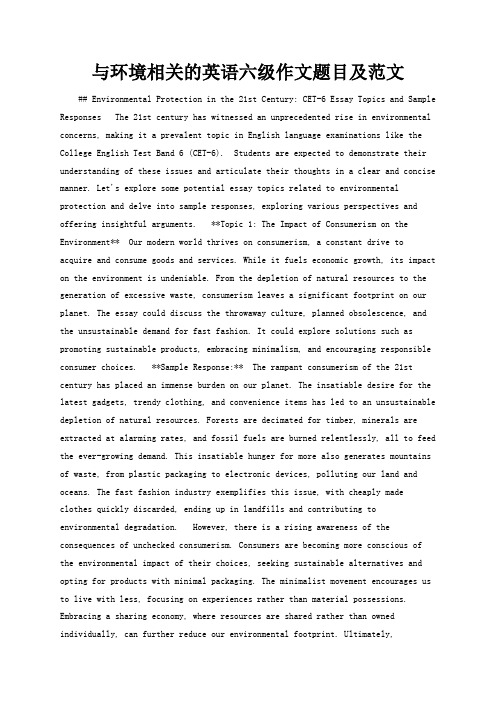
与环境相关的英语六级作文题目及范文## Environmental Protection in the 21st Century: CET-6 Essay Topics and Sample Responses The 21st century has witnessed an unprecedented rise in environmental concerns, making it a prevalent topic in English language examinations like the College English Test Band 6 (CET-6). Students are expected to demonstrate their understanding of these issues and articulate their thoughts in a clear and concise manner. Let's explore some potential essay topics related to environmental protection and delve into sample responses, exploring various perspectives and offering insightful arguments. **Topic 1: The Impact of Consumerism on the Environment** Our modern world thrives on consumerism, a constant drive to acquire and consume goods and services. While it fuels economic growth, its impact on the environment is undeniable. From the depletion of natural resources to the generation of excessive waste, consumerism leaves a significant footprint on our planet. The essay could discuss the throwaway culture, planned obsolescence, and the unsustainable demand for fast fashion. It could explore solutions such as promoting sustainable products, embracing minimalism, and encouraging responsible consumer choices. **Sample Response:** The rampant consumerism of the 21st century has placed an immense burden on our planet. The insatiable desire for the latest gadgets, trendy clothing, and convenience items has led to an unsustainable depletion of natural resources. Forests are decimated for timber, minerals are extracted at alarming rates, and fossil fuels are burned relentlessly, all to feed the ever-growing demand. This insatiable hunger for more also generates mountains of waste, from plastic packaging to electronic devices, polluting our land and oceans. The fast fashion industry exemplifies this issue, with cheaply made clothes quickly discarded, ending up in landfills and contributing to environmental degradation. However, there is a rising awareness of the consequences of unchecked consumerism. Consumers are becoming more conscious of the environmental impact of their choices, seeking sustainable alternatives and opting for products with minimal packaging. The minimalist movement encourages us to live with less, focusing on experiences rather than material possessions. Embracing a sharing economy, where resources are shared rather than owned individually, can further reduce our environmental footprint. Ultimately,transitioning towards responsible consumerism requires a collective effort, with individuals, businesses, and governments working together to promote sustainable practices and prioritize the well-being of our planet. **Topic 2: The Role of Technology in Environmental Protection** Technology is often seen as a double-edged sword when it comes to the environment. While it has contributed topollution and resource depletion, it also offers solutions for mitigating these problems. This essay could explore various technological advancements that are promoting environmental sustainability, such as renewable energy sources, energy-efficient appliances, and smart city initiatives. It could also discuss the potential of artificial intelligence and big data in monitoring and managing environmental issues. **Sample Response:** Technology plays a pivotal role in both the challenges and solutions related to environmental protection. While industrial advancements have historically led to pollution and resource depletion, recent innovations offer a glimmer of hope for a sustainable future. Renewable energy technologies, such as solar and wind power, are rapidly evolving, providing clean and sustainable alternatives to fossil fuels. Energy-efficient appliances and smart grids help reduce energy consumption, minimizing our carbon footprint.In the realm of agriculture, precision farming techniques utilize technology to optimize resource usage and minimize environmental impact. Furthermore, emerging technologies like artificial intelligence and big data offer powerful tools for environmental monitoring and management. algorithms can analyze vast datasets to identify pollution sources, predict environmental changes, and optimize resource allocation. Smart city initiatives leverage technology to improve waste management, reduce traffic congestion, and enhance energy efficiency, creating moresustainable urban environments. While technology alone cannot solve all environmental problems, it undoubtedly holds immense potential to mitigate the damage and pave the way for a greener future. **Topic 3: The Importance of International Cooperation in Addressing Environmental Issues** Environmental issues transcend national boundaries, requiring collaborative efforts on a global scale. This essay could discuss the significance of international agreements and organizations in tackling environmental challenges like climate change, deforestation, and biodiversity loss. It could highlight successful examples ofinternational cooperation and explore the challenges and opportunities infostering global partnerships for environmental protection. **Sample Response:** In an era of globalization, environmental issues demand international cooperation and collective action. Climate change, with its far-reaching consequences, exemplifies the need for a united front. The Paris Agreement, a landmark international treaty, serves as a testament to the global commitment to combatting climate change. It brings together nations to set ambitious goals for reducing greenhouse gas emissions and supporting developing countries in their transitionto a low-carbon future. Deforestation, another pressing environmental concern, also requires international collaboration. The destruction of rainforests not only impacts local ecosystems but also contributes to global climate change. International initiatives like REDD (Reducing Emissions from Deforestation and Forest Degradation) aim to incentivize developing countries to protect theirforests and promote sustainable forest management. While international cooperation presents numerous challenges, such as varying national interests and economic disparities, it remains crucial for addressing environmental issues effectively. Collaborative efforts can foster knowledge sharing, technology transfer, and financial assistance, enabling countries to tackle environmental challenges collectively and work towards a more sustainable future for our planet. **Topic 4: The Role of Individuals in Environmental Protection**。
环境污染海洋生物带来什么样的影响英语作文
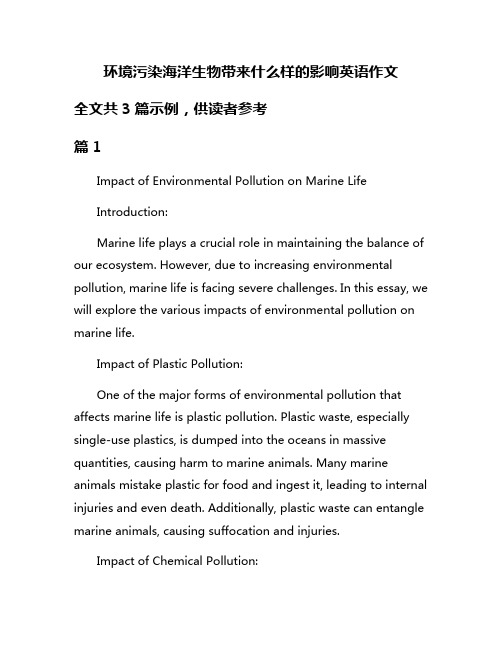
环境污染海洋生物带来什么样的影响英语作文全文共3篇示例,供读者参考篇1Impact of Environmental Pollution on Marine LifeIntroduction:Marine life plays a crucial role in maintaining the balance of our ecosystem. However, due to increasing environmental pollution, marine life is facing severe challenges. In this essay, we will explore the various impacts of environmental pollution on marine life.Impact of Plastic Pollution:One of the major forms of environmental pollution that affects marine life is plastic pollution. Plastic waste, especially single-use plastics, is dumped into the oceans in massive quantities, causing harm to marine animals. Many marine animals mistake plastic for food and ingest it, leading to internal injuries and even death. Additionally, plastic waste can entangle marine animals, causing suffocation and injuries.Impact of Chemical Pollution:Chemical pollution from industrial waste, agricultural runoff, and oil spills also poses a significant threat to marine life. Chemical pollutants contaminate the water and can lead to various health issues in marine animals. For example, oil spills can coat marine animals with toxic substances, affecting their ability to swim, feed, and reproduce. Chemical pollutants can also disrupt the delicate balance of marine ecosystems, leading to a decline in biodiversity.Impact of Climate Change:Climate change, driven by human activities such as burning fossil fuels and deforestation, has a profound impact on marine life. Rising sea temperatures and ocean acidification are causing coral bleaching and the loss of coral reefs, which provide essential habitats for many marine species. Changes in ocean currents and weather patterns are also affecting the distribution and abundance of marine animals, leading to shifts in marine ecosystems.Impact of Overfishing:Overfishing, driven by the increasing demand for seafood, is another significant threat to marine life. Many fish populations are being harvested at unsustainable levels, leading to declines in their numbers and the collapse of fisheries. Overfishing notonly affects the targeted species but also disrupts the entire marine food chain, impacting other marine animals that rely on these species for food.Conclusion:Environmental pollution has a devastating impact on marine life, threatening the health and survival of many species. It is crucial that we take immediate action to reduce our carbon footprint, minimize plastic waste, and protect marine habitats. By promoting sustainable practices and raising awareness about the importance of preserving marine ecosystems, we can ensure a healthy future for marine life and our planet.篇2Effects of Environmental Pollution on Marine LifeIntroductionOceans cover more than 70% of the Earth's surface and are home to a wide variety of marine life. However, the health of marine ecosystems is being threatened by environmental pollution. Pollution from human activities such as industrial discharge, agricultural runoff, and plastic waste is having a devastating impact on marine organisms and ecosystems. In thisessay, we will explore the effects of environmental pollution on marine life and the implications for the health of our oceans.Impact of Pollution on Marine Life1. Chemical PollutionChemical pollution from industrial discharge, oil spills, and agricultural runoff can have toxic effects on marine life. Chemical pollutants such as heavy metals, pesticides, and petroleum products can accumulate in the tissues of marine organisms, causing damage to their organs and disrupting their normal physiological functions. For example, high levels of mercury in fish can lead to reproductive problems and behavioral changes in marine mammals.2. Plastic PollutionPlastic pollution is a major threat to marine life, with millions of tons of plastic waste entering the oceans every year. Marine animals such as sea turtles, seabirds, and marine mammals can become entangled in plastic debris or mistake it for food. Ingesting plastic can cause blockages in the digestive tract, leading to starvation and death. Furthermore, plastic debris can release toxic chemicals into the water, posing a threat to marine organisms.3. Habitat DestructionPollution can also lead to habitat destruction in marine ecosystems. Oil spills can contaminate coastal habitats and disrupt the delicate balance of marine ecosystems, affecting the reproductive success of fish and other marine species. Pollution can also lead to the destruction of coral reefs, which are vital habitats for a wide range of marine organisms. Coral reefs are highly sensitive to changes in water quality and can be devastated by pollution from agricultural runoff and sewage discharge.4. Climate ChangeEnvironmental pollution is also contributing to climate change, which is having a profound impact on marine ecosystems. Rising ocean temperatures and ocean acidification are causing coral reefs to bleach and die, threatening the survival of countless marine species. Climate change is also altering the distribution of marine species, leading to shifts in ecosystem dynamics and disrupting the balance of marine food webs.Implications for the Health of Our OceansThe effects of environmental pollution on marine life have significant implications for the health of our oceans. Marineecosystems provide vital services to humans, including food, oxygen production, and the regulation of climate. The loss of marine biodiversity due to pollution can have far-reaching consequences for the health and resilience of marine ecosystems. Furthermore, the environmental pollution can harm human health through the consumption of contaminated seafood and exposure to toxic chemicals.ConclusionIn conclusion, environmental pollution is having a devastating impact on marine life and marine ecosystems. It is essential that we take urgent action to reduce pollution and protect the health of our oceans. This requires a coordinated effort from governments, industries, and individuals to reduce our carbon footprint, improve waste management, and promote sustainable practices. By addressing the root causes of pollution and working together to protect our marine ecosystems, we can ensure a healthy and vibrant ocean for future generations.篇3Environmental pollution has become a pressing issue in recent years, especially when it comes to the pollution of the world's oceans. The impact of environmental pollution on marinelife is severe, affecting not only the animals that call the ocean home but also humans who rely on the ocean for food and livelihood.One of the most noticeable effects of environmental pollution on marine life is the contamination of water bodies with toxic substances. Chemicals and pollutants from industries, cities, and agricultural runoff can make their way into rivers and oceans, harming marine organisms. These contaminants can disrupt the delicate balance of marine ecosystems, leading to declines in fish populations, coral bleaching, and the death of other marine species.Plastic pollution is another major issue that affects marine life. Every year, millions of tons of plastic waste end up in the world's oceans, where it poses a serious threat to marine animals. Animals like turtles, seabirds, and whales can ingest plastic and become entangled in debris, leading to injury and death. Microplastics, tiny pieces of plastic that are less than 5mm in size, can also be consumed by marine organisms, causing harm to their health and well-being.The effects of environmental pollution on marine life go beyond just the animals themselves. Humans who rely on the ocean for food and income are also impacted by pollution.Contaminated fish and seafood can pose health risks to consumers, leading to illnesses and diseases. Coastal communities that depend on fishing and tourism for their livelihoods can also suffer from the decline in marine biodiversity and health caused by pollution.In conclusion, environmental pollution has a significant impact on marine life, affecting both the animals that live in the ocean and humans who rely on it for sustenance and livelihood. It is crucial that we take action to reduce pollution and protect our oceans for future generations. By implementing stricter regulations, investing in sustainable practices, and raising awareness about the importance of ocean conservation, we can work towards a cleaner and healthier marine environment for all.。
人类对自然环境的影响英语作文

人类对自然环境的影响英语作文Title: The Impact of Human Activity on the Natural EnvironmentThe natural environment has long been a source of awe and wonder for human beings. From the towering mountains to the vast oceans, the natural world has provided us with the resources and the inspiration to thrive and evolve. However, in recent decades, the impact of human activity on the natural environment has become increasingly apparent, posing a serious threat to the delicate balance of our planet.One of the most significant ways in which human activity has impacted the natural environment is through the burning of fossil fuels. The use of coal, oil, and natural gas to power our homes, businesses, and transportation has resulted in the release of vast quantities of greenhouse gases into the atmosphere. These gases, such as carbon dioxide andmethane, trap heat and contribute to the phenomenon of global warming, leading to a rise in average global temperatures and a host of other environmental consequences.The effects of global warming can be seen in a variety of ways. Arctic sea ice is melting at an alarming rate, threatening the habitat of polar bears and other Arctic wildlife. Glaciers are retreating, causing sea levels to rise and putting coastal communities at risk of flooding. Extreme weather events, such as hurricanes, wildfires, and droughts, are becoming more frequent and more severe, causing widespread destruction and disrupting the lives of millions of people.Another major impact of human activity on the natural environment is the loss of biodiversity. As the human population has grown and our demand for land, resources, and food has increased, we have encroached on the habitats of countless species, driving them to the brink of extinction.Deforestation, pollution, and habitat fragmentation have all contributed to the decline of many plant and animal species, with some estimates suggesting that we are currently experiencing the sixth mass extinction in the history of the planet.The loss of biodiversity has far-reaching consequencesfor the health of our ecosystems. Many species play crucial roles in maintaining the delicate balance of natural systems, and the loss of these species can have cascading effects that ripple through the entire ecosystem. This can lead to the loss of important ecosystem services, such as the pollination of crops, the regulation of water and air quality, and the provision of food and medicine.In addition to the environmental impacts of human activity, there are also significant social and economic consequences. The degradation of the natural environment can have a disproportionate impact on the world's poorest andmost vulnerable populations, who often rely on the natural environment for their livelihoods and are the least equipped to adapt to the changing conditions.For example, the loss of arable land and the disruption of weather patterns can lead to food insecurity and famine, particularly in developing countries. The pollution of water sources can cause the spread of waterborne diseases, while the destruction of natural habitats can disrupt thetraditional ways of life of indigenous communities.The economic costs of environmental degradation are also significant. The damage caused by natural disasters, the loss of biodiversity, and the depletion of natural resources can all have a major impact on industries and businesses thatrely on a healthy natural environment. The transition to more sustainable practices and technologies can also be costly, particularly for smaller businesses and developing countries.Despite the significant challenges posed by the impact of human activity on the natural environment, there is reasonfor hope. In recent years, there has been a growing awareness of the need to take action to protect the planet and its resources. Governments, businesses, and individuals aroundthe world are taking steps to reduce their environmental footprint and to promote more sustainable practices.For example, many countries have set ambitious targetsfor the reduction of greenhouse gas emissions and thetransition to renewable energy sources. Businesses are increasingly adopting more sustainable practices, such as reducing waste, using renewable materials, and investing in renewable energy. And individuals are making changes to their lifestyles, such as reducing their use of single-use plastics, choosing more energy-efficient transportation, and supporting businesses that prioritize sustainability.However, much more needs to be done to address the pressing environmental challenges we face. Concerted global efforts, involving governments, businesses, and individuals, will be needed to make the necessary changes to our economic and social systems to ensure a sustainable future for our planet and its inhabitants.In conclusion, the impact of human activity on thenatural environment is a complex and multifaceted issue that requires a comprehensive and coordinated response. From the burning of fossil fuels to the loss of biodiversity, the consequences of our actions are far-reaching and potentially catastrophic. But by recognizing the urgency of the situation and taking concrete steps to address it, we can work to protect the natural world and ensure a sustainable future for generations to come.。
人类会以什么方式影响生态系统英语作文
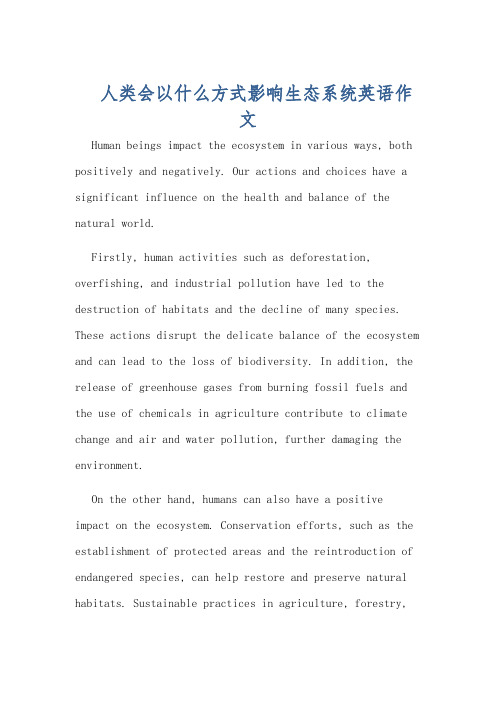
人类会以什么方式影响生态系统英语作文Human beings impact the ecosystem in various ways, both positively and negatively. Our actions and choices have a significant influence on the health and balance of the natural world.Firstly, human activities such as deforestation, overfishing, and industrial pollution have led to the destruction of habitats and the decline of many species. These actions disrupt the delicate balance of the ecosystem and can lead to the loss of biodiversity. In addition, the release of greenhouse gases from burning fossil fuels and the use of chemicals in agriculture contribute to climate change and air and water pollution, further damaging the environment.On the other hand, humans can also have a positive impact on the ecosystem. Conservation efforts, such as the establishment of protected areas and the reintroduction of endangered species, can help restore and preserve natural habitats. Sustainable practices in agriculture, forestry,and fishing can help minimize the negative impact on the environment and ensure the long-term health of ecosystems.Furthermore, education and awareness play a crucial role in shaping human behavior towards the environment. By promoting environmental literacy and encouraging sustainable lifestyles, we can reduce our ecological footprint and mitigate the negative effects of human activities on the ecosystem.In conclusion, human beings have a significant influence on the ecosystem, and it is essential that we recognize our responsibility to protect and preserve the natural world. By making conscious choices and adopting sustainable practices, we can minimize our negative impact and work towards a harmonious coexistence with the environment.人类以各种方式影响生态系统,既有积极的影响,也有消极的影响。
思维导图型环境保护类作文英语试题
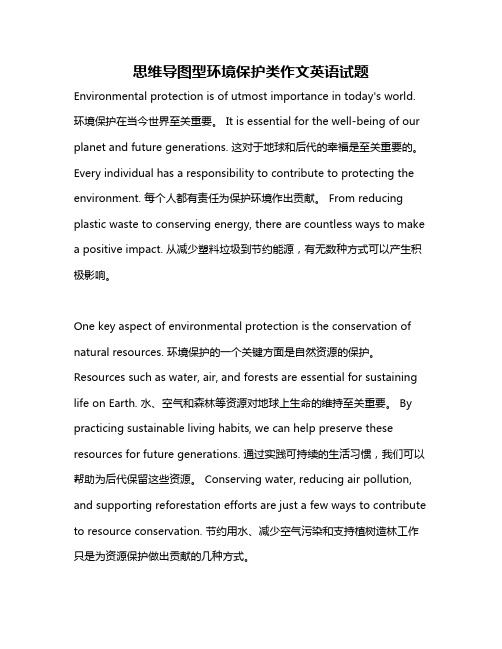
思维导图型环境保护类作文英语试题Environmental protection is of utmost importance in today's world. 环境保护在当今世界至关重要。
It is essential for the well-being of our planet and future generations. 这对于地球和后代的幸福是至关重要的。
Every individual has a responsibility to contribute to protecting the environment. 每个人都有责任为保护环境作出贡献。
From reducing plastic waste to conserving energy, there are countless ways to make a positive impact. 从减少塑料垃圾到节约能源,有无数种方式可以产生积极影响。
One key aspect of environmental protection is the conservation of natural resources. 环境保护的一个关键方面是自然资源的保护。
Resources such as water, air, and forests are essential for sustaining life on Earth. 水、空气和森林等资源对地球上生命的维持至关重要。
By practicing sustainable living habits, we can help preserve these resources for future generations. 通过实践可持续的生活习惯,我们可以帮助为后代保留这些资源。
Conserving water, reducing air pollution, and supporting reforestation efforts are just a few ways to contribute to resource conservation. 节约用水、减少空气污染和支持植树造林工作只是为资源保护做出贡献的几种方式。
大学英语四级作文真题 保护环境
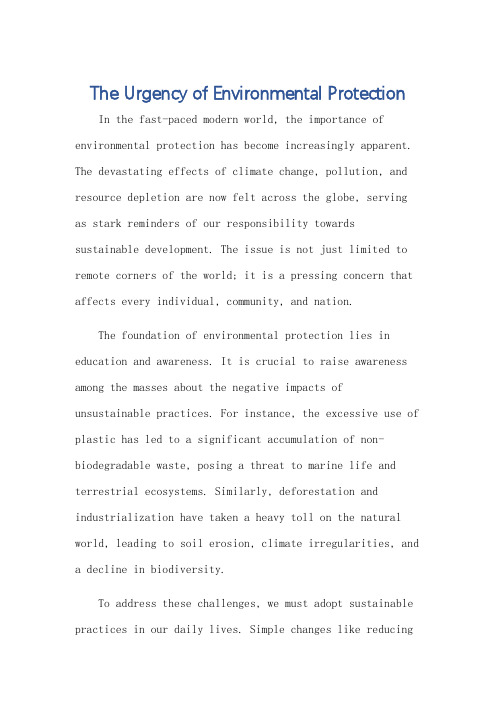
The Urgency of Environmental ProtectionIn the fast-paced modern world, the importance of environmental protection has become increasingly apparent. The devastating effects of climate change, pollution, and resource depletion are now felt across the globe, serving as stark reminders of our responsibility towards sustainable development. The issue is not just limited to remote corners of the world; it is a pressing concern that affects every individual, community, and nation.The foundation of environmental protection lies in education and awareness. It is crucial to raise awareness among the masses about the negative impacts of unsustainable practices. For instance, the excessive use of plastic has led to a significant accumulation of non-biodegradable waste, posing a threat to marine life and terrestrial ecosystems. Similarly, deforestation and industrialization have taken a heavy toll on the natural world, leading to soil erosion, climate irregularities, and a decline in biodiversity.To address these challenges, we must adopt sustainable practices in our daily lives. Simple changes like reducingthe use of plastic, conserving water, and using public transport can make a significant difference. Furthermore, governments and international organizations need to implement policies and regulations that promote environmental protection. For instance, investing in renewable energy sources, promoting green technologies, and implementing strict pollution control measures are crucial steps towards achieving a sustainable future.The role of individuals cannot be overstated in this effort. Every individual has the power to make a difference. By making informed choices and adopting sustainable practices, we can contribute to the protection of our planet. For instance, we can choose to buy products made from recycled materials, support companies that prioritize environmental sustainability, and reduce our carbonfootprint by walking or cycling instead of driving.In conclusion, environmental protection is a shared responsibility that requires concerted efforts from individuals, communities, and governments. The time to actis now. We must come together to protect our planet andensure a sustainable future for ourselves and the generations that follow.**环境保护的紧迫性**在快速发展的现代世界中,环境保护的重要性变得越来越明显。
核污水对生活造成影响的英语作文
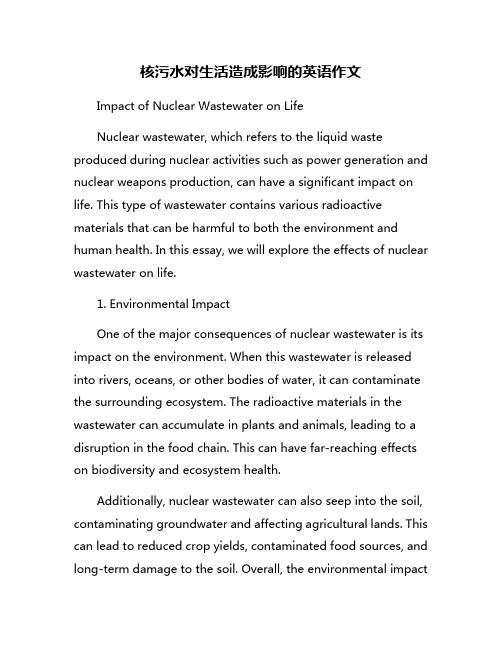
核污水对生活造成影响的英语作文Impact of Nuclear Wastewater on LifeNuclear wastewater, which refers to the liquid waste produced during nuclear activities such as power generation and nuclear weapons production, can have a significant impact on life. This type of wastewater contains various radioactive materials that can be harmful to both the environment and human health. In this essay, we will explore the effects of nuclear wastewater on life.1. Environmental ImpactOne of the major consequences of nuclear wastewater is its impact on the environment. When this wastewater is released into rivers, oceans, or other bodies of water, it can contaminate the surrounding ecosystem. The radioactive materials in the wastewater can accumulate in plants and animals, leading to a disruption in the food chain. This can have far-reaching effects on biodiversity and ecosystem health.Additionally, nuclear wastewater can also seep into the soil, contaminating groundwater and affecting agricultural lands. This can lead to reduced crop yields, contaminated food sources, and long-term damage to the soil. Overall, the environmental impactof nuclear wastewater can be detrimental to the health of ecosystems and wildlife.2. Human Health ImpactIn addition to its effects on the environment, nuclear wastewater can also have serious implications for human health. When people are exposed to radioactive materials through contaminated water sources or food, they may experience various health problems. These can range from acute effects such as nausea, vomiting, and diarrhea to more seriouslong-term consequences like cancer, genetic mutations, and reproductive issues.Furthermore, nuclear wastewater can also affect the health of workers in nuclear facilities and communities located near these sites. Workers who handle nuclear wastewater are at risk of radiation exposure, which can lead to radiation sickness and other health complications. In communities near nuclear facilities, residents may be exposed to contaminated water sources and suffer from increased rates of cancer and other illnesses.3. Economic ImpactThe impact of nuclear wastewater is not limited to the environment and human health; it also has economicramifications. The cost of cleaning up and disposing of nuclear wastewater can be significant, as it requires specialized equipment and treatment processes to safely remove radioactive materials. Additionally, the long-term effects of nuclear contamination on agricultural lands and water sources can result in decreased crop yields, loss of income for farmers, and increased healthcare costs for affected communities.Furthermore, the presence of nuclear wastewater can also deter investment and development in affected regions. Businesses may be reluctant to establish operations in areas with a history of nuclear contamination, leading to a stagnation in economic growth and job creation. This can further exacerbate the socio-economic challenges faced by communities grappling with the effects of nuclear wastewater.In conclusion, nuclear wastewater can have a profound impact on life, affecting the environment, human health, and the economy. It is crucial for governments, industry stakeholders, and the public to work together to address the challenges posed by nuclear wastewater and mitigate its negative consequences. By implementing stringent regulations, investing in sustainable waste management practices, and raising awareness about therisks associated with nuclear contamination, we can safeguard the well-being of present and future generations.。
关于海洋能源开发的生态影响 英语作文

The Ecological Impact of Ocean Energy DevelopmentThe vast and mysterious expanse of the ocean,long a symbol of untamed power and mystery,now emerges at the forefront of renewable energy development.As the world seeks sustainable alternatives to fossil fuels,ocean energy presents a tantalizing prospect. Yet,the ecological impact of this endeavor looms like a shadow over its potential.Ocean energy development encompasses technologies such as tidal, wave,and thermal energy conversion.These methods harness the powerful forces and temperature gradients inherent in the sea.The allure of predictable tidal cycles and the vast potential of wave energy belies,however,the complex interplay between these technologies and the marine environment.The ecological impact of ocean energy development is manifold.One of the most pressing concerns is the effect on marine life.The construction and operation of tidal turbines and wave energy converters can disrupt habitats and migratory paths.Marine organisms,from plankton to whales,face new barriers in their ancient routes of travel.The vibrations and noise generated by these structures can disorient and deter wildlife, altering the delicate symphony of the deep.Moreover,the physical structures themselves can have devastating effects.Collisions with marine animals are not uncommon,posing significant threats to endangered species.The anchoring of these devices can damage the seafloor,affecting the communities of creatures that make their homes on the ocean floor.This disturbance extends beyond the immediate location,as sediment and nutrient flows can be altered,impacting broader ecosystems.Coral reefs,already under siege from climate change and pollution,face further threats from changes in water quality and temperature associated with some forms of ocean energy extraction.These vibrant ecosystems,which support myriad marine life and offer coastal protection,are particularly vulnerable to even subtle alterations in their environments.In addition to direct ecological impacts,there are also indirect consequences.The energy transmission infrastructure needed to bring power from remote ocean locations to coastal populations can itself lead to environmental disruption.The undersea cables and pipelines required for this purpose can fragment habitats,interfere with fishing practices,and potentially cause pollution events in the case of leaks or breaks.Furthermore,the economic and political forces driving ocean energy development can conflict with conservation efforts.Areas rich in marine life may see increased commercial activity,raising the specter of overexploitation and habitat destruction.The competition for space and resources between energy development and environmental preservation is a delicate balance to strike.In conclusion,while the pursuit of ocean energy offers a glimmer of hope in the quest for clean energy,it is imperative to navigate this path with utmost care.The ecological impact of ocean energy development is a multifaceted issue,one that requires comprehensive environmental assessments and proactive conservation measures.Only by balancing the urgent need for energy with the long-term health of our oceans can we ensure a sustainable future.Let the whispers of the waves guide us to harness their power without forsaking their beauty and life-giving essence.。
海洋中的大气污染英语作文

海洋中的大气污染英语作文In recent years, the issue of atmospheric pollution has extended its reach beyond land and into the vast expanses of our oceans. This English composition aims to explore the causes, consequences, and potential solutions to this pressing environmental concern.The oceans, covering over 70% of the Earth's surface, are not just vast bodies of water but also intricate ecosystems that support a diverse array of marine life. However, they are increasingly becoming repositories for pollutants carried by the atmosphere. The primary sources of atmospheric pollution that affect the oceans include industrial emissions, agricultural runoff, and the burning of fossil fuels.One of the most significant pollutants is carbon dioxide (CO2), which, when absorbed by seawater, leads to ocean acidification. This process has a detrimental impact on marine life, particularly organisms with calcium carbonate shells, such as corals and mollusks. Acidification disrupts the food chain and threatens the biodiversity of the ocean.Another consequence of atmospheric pollution is the deposition of harmful substances like heavy metals and persistent organic pollutants (POPs) into the ocean. These substances can accumulate in the tissues of marine organisms, leading to bioaccumulation and biomagnification, which pose risks to both marine ecosystems and human health.To address the issue of atmospheric pollution in the oceans, a multi-faceted approach is necessary. Firstly, international agreements and regulations need to be enforced to limit emissions of greenhouse gases and other pollutants. The Paris Agreement is a step in the right direction, but more ambitious goals and stricter enforcement are required.Secondly, the promotion of clean energy and the reduction of reliance on fossil fuels are crucial. Investing in renewable energy sources like solar, wind, and hydroelectric power can significantly reduce CO2 emissions.Education and awareness campaigns can also play a vital role in changing public behavior and encouraging individuals to adopt more sustainable practices. Simple actions like reducing, reusing, and recycling can help decrease the amount of waste that ends up in the oceans.In conclusion, atmospheric pollution in the oceans is a complex issue that requires a concerted effort from governments, industries, and individuals. By understanding the causes and consequences, we can work towards implementing effective strategies to protect our oceans and the life they support. The future of our blue planet depends on our collective actions today.。
核废水对环境的影响,英文作文
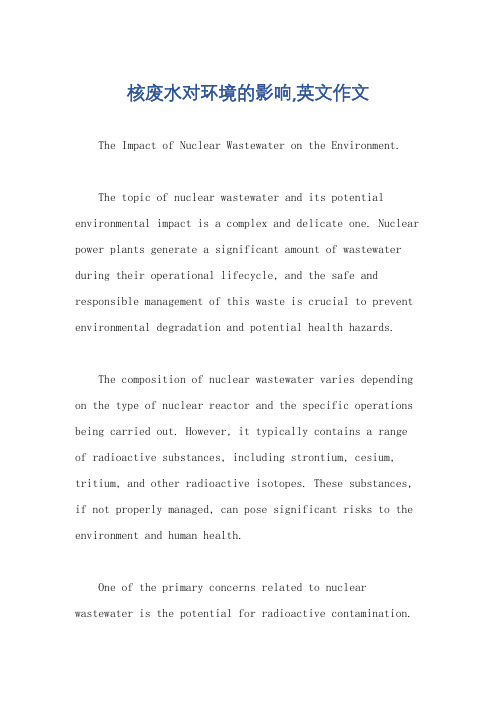
核废水对环境的影响,英文作文The Impact of Nuclear Wastewater on the Environment.The topic of nuclear wastewater and its potential environmental impact is a complex and delicate one. Nuclear power plants generate a significant amount of wastewater during their operational lifecycle, and the safe and responsible management of this waste is crucial to prevent environmental degradation and potential health hazards.The composition of nuclear wastewater varies depending on the type of nuclear reactor and the specific operations being carried out. However, it typically contains a range of radioactive substances, including strontium, cesium, tritium, and other radioactive isotopes. These substances, if not properly managed, can pose significant risks to the environment and human health.One of the primary concerns related to nuclear wastewater is the potential for radioactive contamination.Radioactive substances can accumulate in soil and water bodies, affecting aquatic life and potentially entering the food chain. This can lead to long-term ecological damage and pose a risk to human health, especially in areas where the contaminated water is used for irrigation or drinking purposes.Additionally, nuclear wastewater can have a negative impact on the biodiversity of an area. Radioactive substances can disrupt the natural balance of ecosystems, affecting plant growth, soil fertility, and the reproductive cycles of aquatic and terrestrial organisms. Long-term exposure to low levels of radiation can also lead to genetic mutations and other health issues in wildlife.The impact of nuclear wastewater is not limited to the immediate environment surrounding the power plant. The movement of water through rivers, lakes, and oceans can spread radioactive contamination over wide areas. This can have a significant impact on fishing industries, tourism, and other economically important sectors that depend on clean and healthy water bodies.The international community has recognized the need for strict regulations and safety measures to manage nuclear wastewater. The International Atomic Energy Agency (IAEA) and other international organizations provide guidance and assistance to member states in developing and implementing effective waste management strategies. These strategies aim to minimize the release of radioactive substances into the environment, ensure the safety of workers and the public, and promote sustainable development.In conclusion, the impact of nuclear wastewater on the environment is a serious concern that requires careful management and continuous monitoring. The responsible handling of nuclear waste is crucial to protect the environment, maintain public health, and promote sustainable development. With the increasing global demand for energy and the corresponding growth in nuclear power generation, it is essential to prioritize the safe and effective management of nuclear wastewater to mitigate its potential environmental impacts.。
四级作文考模板
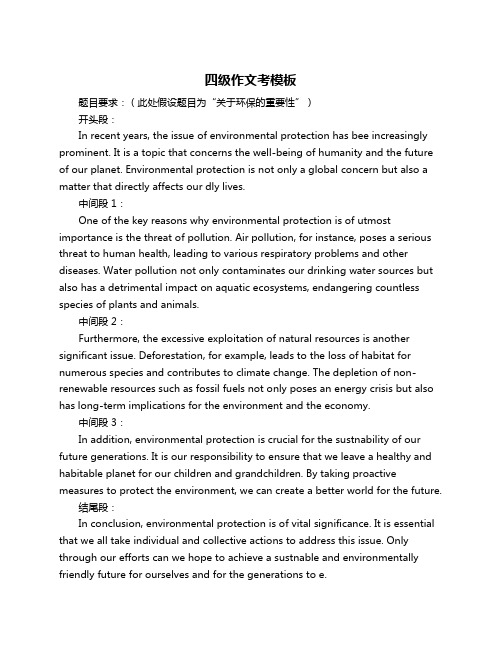
四级作文考模板题目要求:(此处假设题目为“关于环保的重要性”)开头段:In recent years, the issue of environmental protection has bee increasingly prominent. It is a topic that concerns the well-being of humanity and the future of our planet. Environmental protection is not only a global concern but also a matter that directly affects our dly lives.中间段 1:One of the key reasons why environmental protection is of utmost importance is the threat of pollution. Air pollution, for instance, poses a serious threat to human health, leading to various respiratory problems and other diseases. Water pollution not only contaminates our drinking water sources but also has a detrimental impact on aquatic ecosystems, endangering countless species of plants and animals.中间段 2:Furthermore, the excessive exploitation of natural resources is another significant issue. Deforestation, for example, leads to the loss of habitat for numerous species and contributes to climate change. The depletion of non-renewable resources such as fossil fuels not only poses an energy crisis but also has long-term implications for the environment and the economy.中间段 3:In addition, environmental protection is crucial for the sustnability of our future generations. It is our responsibility to ensure that we leave a healthy and habitable planet for our children and grandchildren. By taking proactive measures to protect the environment, we can create a better world for the future.结尾段:In conclusion, environmental protection is of vital significance. It is essential that we all take individual and collective actions to address this issue. Only through our efforts can we hope to achieve a sustnable and environmentally friendly future for ourselves and for the generations to e.。
The impact of fossil fuels on climate change
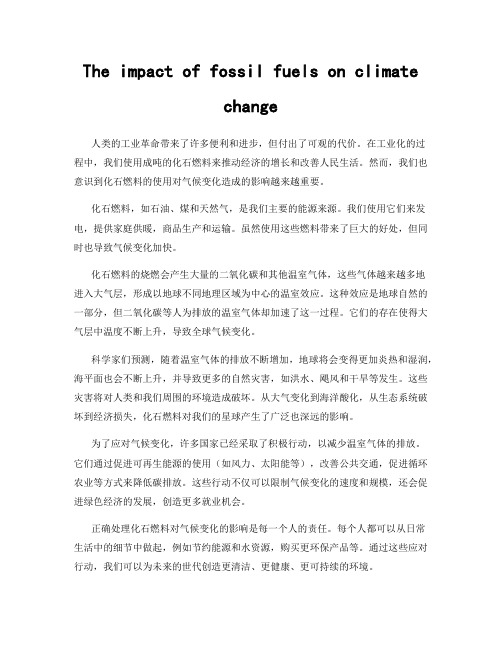
The impact of fossil fuels on climatechange人类的工业革命带来了许多便利和进步,但付出了可观的代价。
在工业化的过程中,我们使用成吨的化石燃料来推动经济的增长和改善人民生活。
然而,我们也意识到化石燃料的使用对气候变化造成的影响越来越重要。
化石燃料,如石油、煤和天然气,是我们主要的能源来源。
我们使用它们来发电,提供家庭供暖,商品生产和运输。
虽然使用这些燃料带来了巨大的好处,但同时也导致气候变化加快。
化石燃料的烧燃会产生大量的二氧化碳和其他温室气体,这些气体越来越多地进入大气层,形成以地球不同地理区域为中心的温室效应。
这种效应是地球自然的一部分,但二氧化碳等人为排放的温室气体却加速了这一过程。
它们的存在使得大气层中温度不断上升,导致全球气候变化。
科学家们预测,随着温室气体的排放不断增加,地球将会变得更加炎热和湿润,海平面也会不断上升,并导致更多的自然灾害,如洪水、飓风和干旱等发生。
这些灾害将对人类和我们周围的环境造成破坏。
从大气变化到海洋酸化,从生态系统破坏到经济损失,化石燃料对我们的星球产生了广泛也深远的影响。
为了应对气候变化,许多国家已经采取了积极行动,以减少温室气体的排放。
它们通过促进可再生能源的使用(如风力、太阳能等),改善公共交通,促进循环农业等方式来降低碳排放。
这些行动不仅可以限制气候变化的速度和规模,还会促进绿色经济的发展,创造更多就业机会。
正确处理化石燃料对气候变化的影响是每一个人的责任。
每个人都可以从日常生活中的细节中做起,例如节约能源和水资源,购买更环保产品等。
通过这些应对行动,我们可以为未来的世代创造更清洁、更健康、更可持续的环境。
2011英语四级作文

2011英语四级作文In today's world, the environment is facing numerous challenges. Pollution, deforestation, and climate change are just a few of the issues that have become a global concern. As a result, it is imperative that we take action to protect our environment for the sake of our health, our planet, and future generations.Firstly, pollution is one of the most pressing issues. Air pollution can lead to respiratory problems and other health issues. Water pollution can contaminate our drinking water and harm aquatic life. Therefore, it is crucial that we implement policies to reduce emissions and promote cleaner energy sources.Secondly, deforestation is another significant problem. Trees absorb carbon dioxide and release oxygen, which is essential for life on Earth. Moreover, forests are home to countless species of plants and animals. We must work to preserve our forests and promote sustainable forestry practices.Lastly, climate change is a global issue that affects everyone. Rising temperatures can lead to more extreme weather events, such as hurricanes and droughts, which can have devastating effects on communities and ecosystems. To combat climate change, we must reduce our carbon footprint and transition to renewable energy sources.In conclusion, environmental protection is of utmost importance. By taking steps to reduce pollution, preserve our forests, and combat climate change, we can ensure a healthier and more sustainable future for all. It is the responsibility of every individual, community, and government to work together to protect our environment.。
The Importance of Environmental Protection
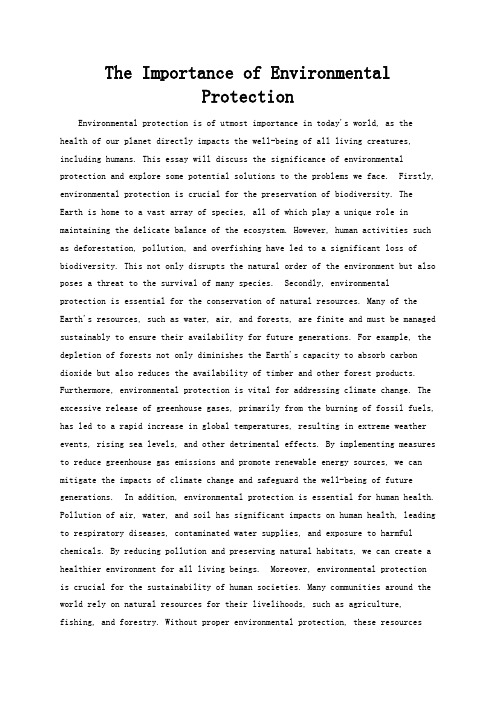
The Importance of EnvironmentalProtectionEnvironmental protection is of utmost importance in today's world, as the health of our planet directly impacts the well-being of all living creatures, including humans. This essay will discuss the significance of environmental protection and explore some potential solutions to the problems we face. Firstly, environmental protection is crucial for the preservation of biodiversity. The Earth is home to a vast array of species, all of which play a unique role in maintaining the delicate balance of the ecosystem. However, human activities such as deforestation, pollution, and overfishing have led to a significant loss of biodiversity. This not only disrupts the natural order of the environment but also poses a threat to the survival of many species. Secondly, environmentalprotection is essential for the conservation of natural resources. Many of the Earth's resources, such as water, air, and forests, are finite and must be managed sustainably to ensure their availability for future generations. For example, the depletion of forests not only diminishes the Earth's capacity to absorb carbon dioxide but also reduces the availability of timber and other forest products. Furthermore, environmental protection is vital for addressing climate change. The excessive release of greenhouse gases, primarily from the burning of fossil fuels, has led to a rapid increase in global temperatures, resulting in extreme weather events, rising sea levels, and other detrimental effects. By implementing measures to reduce greenhouse gas emissions and promote renewable energy sources, we can mitigate the impacts of climate change and safeguard the well-being of future generations. In addition, environmental protection is essential for human health. Pollution of air, water, and soil has significant impacts on human health, leading to respiratory diseases, contaminated water supplies, and exposure to harmful chemicals. By reducing pollution and preserving natural habitats, we can create a healthier environment for all living beings. Moreover, environmental protection is crucial for the sustainability of human societies. Many communities around the world rely on natural resources for their livelihoods, such as agriculture, fishing, and forestry. Without proper environmental protection, these resourcesmay become depleted, jeopardizing the well-being of these communities and leading to social and economic instability. In conclusion, environmental protection is of paramount importance for the preservation of biodiversity, conservation of natural resources, mitigation of climate change, protection of human health, and sustainability of human societies. It is imperative that we take action to address the environmental challenges we face, both on a local and global scale, to ensure a sustainable and healthy future for all.。
- 1、下载文档前请自行甄别文档内容的完整性,平台不提供额外的编辑、内容补充、找答案等附加服务。
- 2、"仅部分预览"的文档,不可在线预览部分如存在完整性等问题,可反馈申请退款(可完整预览的文档不适用该条件!)。
- 3、如文档侵犯您的权益,请联系客服反馈,我们会尽快为您处理(人工客服工作时间:9:00-18:30)。
Department of Earth Science and Engineering, Royal School of Mines, Imperial College London, Prince Consort Road, London SW7 2BP, UK Elsevier use only: Received date here; revised date here; accepted date here
* Corresponding author. Tel.: +44-20-7594-7372; fax: +44-20-7594-7354. E-mail address: a.korre@
doi:10.1016/j.egypro.2011.02tla. /l.E/ nEenregrygyPProrocceeddiiaa 400(2(2001110)) 200501–00–020517
⃝c© 201101EPlusebvlisehr eLdtdb.yAElllrsiegvhitesrrLestedr.ved
Keywords: Life cycle assessment; Oxy-fuel combustion; Post-combustion; CO2 capture and storage
1. Introduction
The CO2 capture technologies offer a number of alternatives, which involve different power generation and capture routes with varied energy consumption rates and subsequent environmental impacts. The holistic perspective offered by Life Cycle Assessment (LCA) can help decision makers to quantify the trade-offs inherent in any change to the power production systems and ensure that a reduction in greenhouse gas (GHG) emissions would not cause increases in other environmental impacts. The life cycle performance of various power generation plant configurations with alternative CO2 capture systems, transport and injection scenarios have been investigated by previous LCA studies [1, 2, 3, 4, 5, 6, 7]. However, since these studies are based on a low resolution analysis (plant level analysis or gate-to-gate data from generic databases), these studies report wide ranging results for climate change impacts and other impact categories such as abiotic resource depletion, acidification, human toxicity, etc. which cannot be adequately characterised in coarse resolution LCA studies. The use of gate-to-gate data implies that the electricity generation systems have been largely simplified to a single blackbox with constants and linear coefficients used to assign inputs and outputs, covering a broad range of technological and geographical differences, in which the actual variability of process parameters and operating conditions are implicitly neglected. In addition, plant level analysis limits the capacity of such studies to quantify the trade-offs inherent in any change to the power production systems and restrict the ability to identify design options that eliminate highly polluting emissions.
Abstract
The oxy-fuel combustion CO2 capture route and post-combustion CO2 capture route involve different energy consumption rates and subsequent environmental impacts. The holistic perspective offered by Life Cycle Assessment (LCA) can help decision makers to compare alternative CO2 capture and storage technologies in a life cycle perspective. This paper, at first, introduces the principles of the dynamic LCA model developed for oxy-fuel combustion and post-combustion power generation with CO2 capture, transport and injection processes. Next, a comparative life cycle assessment of alternative CO2 capture technologies is presented. Results show that, at life-cycle level, the post-combustion and oxy-fuel combustion CCS cases can reduce the life-cycle Global Warming Potential (GWP) by 78.8% and 80.0% respectively compared to conventional power plant without CCS. Other environmental impacts, such as Ecotoxicity, Human toxicity and Acidification, vary significantly with the different CO2 capture routes employed. Finally, by comparing the results obtained with the most recent LCA studies of post-combustion power generation with CO2 capture and storage, it is shown that the plant level, gate-to-gate studies provide significantly variable results and generally overestimate life cycle environmental impacts.
In this respect, the dynamic LCA model developed at Imperial College incorporates fossil fuel power generation, CO2 capture, CO2 conditioning, pipeline transportation and injection and storage, and quantifies the environmental impacts at the highest level of detail, allowing for the assessment of technical and geographical differences between the alternative power
2511
generation, CO2 capture, transport and storage technologies considered. An earlier paper by the authors [8] presents the postcombustion life cycle model developed while this paper presents the principles of the LCA models developed for the oxy-fuel power generation and CO2 capture system and discusses, in detail, the comparative assessment carried out between the postcombustion and oxy-fuel capture options modelled.
